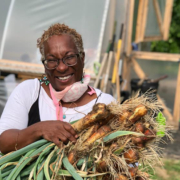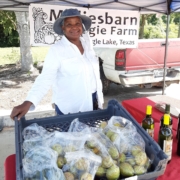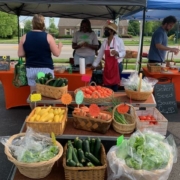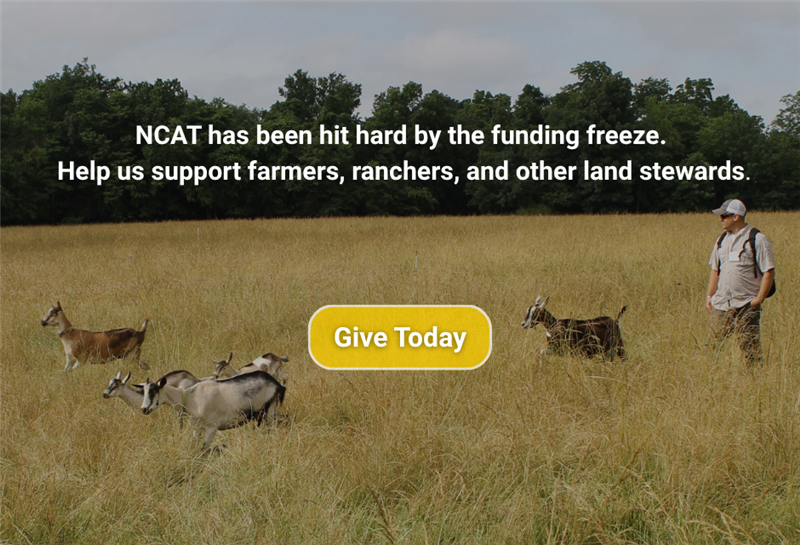Ed Hunt
Ed Hunt is a recipient of the Excellence in Regional Collaboration Award, which acknowledges the work of a professional who has developed and implemented innovative collaborations across sectors and regions to secure a more vibrant future for all people in their communities.
Ed grew up on a farm in Robeson County, North Carolina, farmed all of his life, and now manages 100 acres of row crops, including mixed row crops, soybeans, corn, and forestry management areas. These include loblolly pine, but they are mostly hardwood tracts for wildlife restoration that are attracting deer. Ed holds degrees in forestry, natural resource management, and agricultural sciences from NCA&T. He feels that his education at NCA&T was the best thing that happened to him. NCA&T took the lead in teaching farmers to improve their land, taught about the use of settling ponds to improve water quality coming from their farm, taught tree planting, and taught wildlife habitat restoration.
Now Ed works for UNC Pembroke, where he is establishing an agriculture program to educate farmers of Color in the region. He is a part of the Lumbee Tribe of North Carolina, a tribe interested in strengthening its stake in North Carolina agriculture.
Ed is involved with several innovative initiatives to improves the lives of the members of his community, such as working to bring in Community Development Financial Institutions (CDFIs), which allow folks to borrow money without collateralization. He’s involved with UNC Pembroke’s Aghealth Innovation Site (AHIS), which works with land-grants, Extension, owner-business-partners, and sponsors. AHIS is a 15-acre facility working towards GAP-certifying local farmers. It concentrates on four main areas: Demonstrate, Train, Certify, and Research. Because of the unique soils and native plants in the region, they want to find a new crop to fill the void left by the tobacco industry in Southeast North Carolina.
Many in the region hoped to produce vegetables to fill the void left by the demise of the tobacco industry in the region, but this was a difficult transition for farmers used to being row-crop producers. There is interest in using the local agricultural lands to offset some of the logistics involved in producing soup within the region by increasing local vegetable production. They have attempted things like teaching different farm owners about the various methods of irrigation and farming techniques–like the use of high tunnels and aquaponics and hydroponics.
Ed converted his own operation to no-till practices and moved away from synthetic fertilizers. He is also a master beekeeper and was managing 50 beehives, until they were lost to flooding. He supports some of the small farms in the region by serving their pollination needs. To him, success looks like making his farm as aesthetic as possible while not negatively impacting water and soil quality. His main concern is that what he does on his farm is in accordance to working with nature.
Ed cites the benefits he’s experienced from UNC Pembroke’s development of its agriculture program, the local Extensions, and Land Grant institutions, including both UNC and NCA&T, as well as Clemson University. He says his relationship with NCA&T was the most important: his Momma suggested he go there, and it was the best advice she could have given him. He learned about the struggle faced by farmers of color, and that formed the foundation of the work he does today.
Ed says that discrimination has been his primary challenge. He had a very hard time getting his farm financed and was denied by several local lending agencies. Hunt advises that producers should learn some of the ins and outs of farm financing. Not having capital makes it quite difficult to farm, so he recommends getting the finances straight before getting too deep into farming, whether those finances come from family or financial agencies or the government. He says it would help remove some financial barriers if there were better new-farmer support from CDFIs or if the verbiage in the current loan documents of financial institutions were changed to make it more understandable for producers.
The greatest barriers he sees is farmer education, lack of diversity, and getting farmers to really examine their farms in a critical way. His advice is to continue offering workshops, as NCA&T has done, even though the farmers are busy. He hopes to remove barriers to create educational opportunities for those interested in agriculture because we are all a part of agriculture, and food and fiber are important to all of us.
Ed feels that the networks that serve the community could perform better by getting out of the silos they work within because collaboration and outreach are most important. Farmers benefit from learning by doing, not just hearing theory in a classroom. For example, he says his beekeeping training was hands-on, as well as written. Leaving those silos also means to him learning to collaborate, not just in regions but across the whole United States.
Hunt feels that sponsors and collaboration are important to benefit local farmers and students. He notes that the price increase for inputs causes new stresses and necessitates new ways that things need to be done just to maintain. He stresses that another thing that can help farmers is for people to simply buy local.












